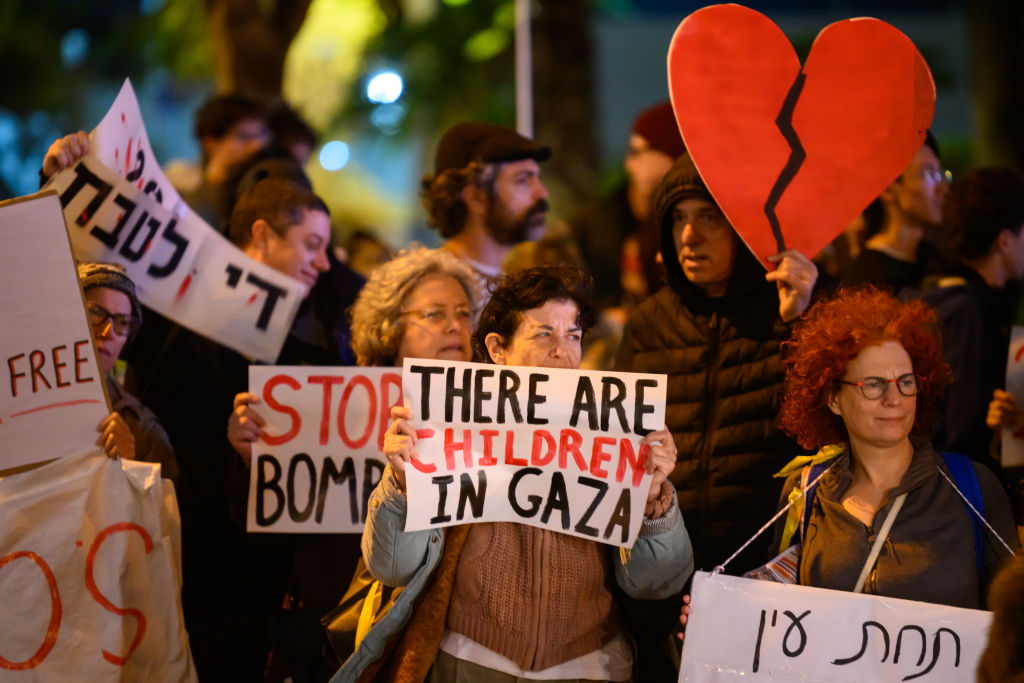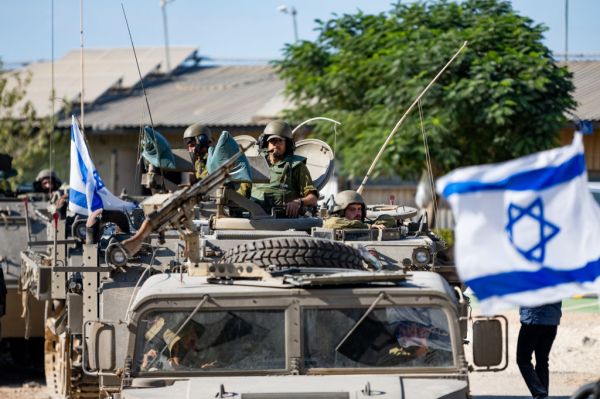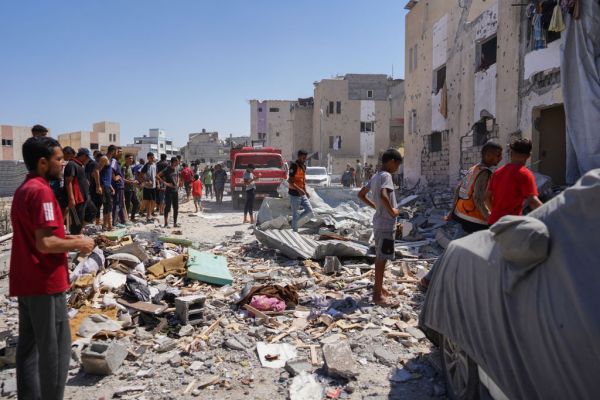Israel’s enemies are winning the propaganda war. And here I thought the only kind of operation they were any good at was blowing up children in pizza shops.
It is remarkable—shameful, too, but really remarkable—how effective the opponents of the Jewish state have been in arm-twisting something close to the entirety of the Western intelligentsia into accepting Hamas’ framing of the war, now habitually described in nearly every journalistic venue as “Israel’s war in Gaza,” as though the Israelis simply woke up one Sunday morning and decided to wage a war in Gaza with no precipitating event. On practically every front page, the war is discussed as though the overriding issue were civilian casualties in Gaza (as though Israel’s actual military objects were an afterthought) and as though these civilian casualties were being caused by Israeli callousness rather than by Hamas’ intentional strategy of sheltering its military assets among the civilian population, in schools and in hospitals and in residential areas, for the express purpose of maximizing civilian casualties.
Nothing new here.
From the beginning, the Arab forces looking to eliminate the Jewish state (or proto-state) have exhibited two characteristics that have defined almost every engagement in the conflict. The first—and, ultimately, the more important—is cowardice; the second is an inclination toward moral blackmail, using the fact that the civilized world is civilized to hamper the response of the people who do not go around sawing the heads off of children in their fight against the people who do. October 7 was the most recent in a long, dreadfully monotonous series: The day before Israel declared independence in 1948, 20 Jewish women hiding in a basement in Kfar Etzion as their husbands and sons were massacred above them were themselves massacred by Arab fighters who threw hand grenades into the basement. In 2014, Palestinians attacked synagogue worshippers with guns, knives, and axes, killing, among others, three Americans. In 2019, they blew up a teenage girl with an IED. In 2001, they bombed a Sbarro restaurant in Jerusalem, killing, among others, seven children and a pregnant woman. The Battle of the Pizza Shop might be considered the apex of Palestinian valor—but if you put actual soldiers on the other side of the line, the Palestinian men at arms will cower in hospitals, schools, and mosques, and then howl when the Israeli military turns its fire on those hospitals, schools, and mosques. That is the story, over and over again.
The Israelis would be perfectly happy to meet Hamas and the other Palestinian champions on what used to be called a battlefield. It would be very convenient for the Israelis, because while the Palestinians are very apt when it comes to massacring unarmed mothers and burning children to death, they are, and generally have been for decades, feckless and unreliable fighters against armed men. And so they hide behind their mothers’ skirts.
Cowards cower—that is what they do. Moral judgments aside, there is in that an important matter of fact that should inform how we think about this conflict: The civilian deaths in Gaza are, indeed, horrifying—and they are the result of Palestinian choices, not the result of Israeli choices. The Palestinians, in this case in the form of Hamas, have chosen the battlefield, locating it among civilians and women and children. The Israelis can pursue their entirely valid military objectives in the most decent and sparing way possible, but they cannot—and should not be expected to—fight the war on terms set by Palestinian terrorists.
Israel’s military mission in the immediate term is the elimination of the Hamas threat, and Hamas has done everything it can to ensure that Israel cannot effectively pursue this goal without causing significant civilian casualties. Hence, either there will be significant civilian casualties, or Israel will abandon its military objectives. That’s the choice forced on Israel by Hamas. Avoiding such casualties is a legitimate, but subordinate, concern. Israel is fighting a war for its survival against an eliminationist enemy; it is not fighting a war as a chance to demonstrate how exquisitely attuned to the sensibilities of its critics and enemies it can be.
The terrorists should not be empowered to set the terms of the conflict. Nor should the world judge Israeli actions on terms set by Palestinians terrorists, or without due regard for the fact that civilians are in the crossfire because Hamas—not Israel—has put them there. This is the fundamental fact of the case that too many of those who dominate the conversation are madly committed to ignoring.
These facts are plain and indisputable. And, yet, every day the ladies and gentlemen of the New York Times and the Washington Post demand to know whether the Israelis are doing enough to avoid civilian casualties rather than whether Hamas is doing anything at all to avoid them. In reality, there would be no civilian casualties in Gaza to speak of if not for the actions taken by Hamas and its allies and enablers. Even here at The Dispatch, you can read Bonnie Kristian advising the Israelis that they should work toward “bombing fewer Palestinian kids,” as though it were the Israelis and not the Palestinians who were—and are—targeting children. (It is interesting to me how and where the cutesy-rhetorical “kids” gets deployed in our public discourse, but that is a subject for another day.)
The Palestinians can have peace for their civilians just as soon as they want it. Instead, what we see are Palestinian atrocities committed against Jewish civilians followed by wailing demands for a “ceasefire” about two minutes after any Israeli response gets under way. It is cowardly, craven, childish, predictable—and, bizarrely, effective, with much of Washington and the Biden administration on board, pressuring the Israelis to subordinate their military objectives to public relations concerns and phony, one-way humanitarianism that enables Hamas terrorism in no small part because it is designed to enable Hamas terrorism. Such are the times.
The Palestinians have had the better part of a century to make peace with the Israelis. What we can reasonably conclude is that the Palestinians do not have peace because the Palestinians do not desire peace, or at least that they do not desire peace on any terms short of the liquidation of the Jewish state. If you believe, as I believe, that the Palestinians are not moral children but are in fact full and whole human beings entangled in the ordinary responsibilities of human community life, then they must have at least some role to play in who speaks—and murders—on their behalf: Qui tacet consentire videtur.
We will know that the Palestinians desire peace when they turn their violence toward the people who have put the civilians of Gaza in the terrible situation they now endure—that is, when Hamas bosses have to worry as much about being killed by Palestinians as being killed by Israelis. Until then, the business of wiping out Hamas will be yet another case of the Israelis doing for the Palestinians that which they cannot or will not do for themselves.









Please note that we at The Dispatch hold ourselves, our work, and our commenters to a higher standard than other places on the internet. We welcome comments that foster genuine debate or discussion—including comments critical of us or our work—but responses that include ad hominem attacks on fellow Dispatch members or are intended to stoke fear and anger may be moderated.